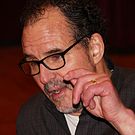Tampilan
Dari In-Christ Wiki, Wiki Kristen Indonesia
"Gregory Boyd is the preaching pastor at Woodland Hills Church in St. Paul, Minn., and the author of God of the Possible and Across the Spectrum, among several books." [1] He is one of the leading proponents of Open theism, one of the most controversial and hotly debated ideas in modern evangelical theology. His first published work, a doctoral dissertation, called 'Trinity and Process: Toward a Synthesis', established the processist philosophical trajectory of all his future works.
Formerly a professor of Theology at Bethel College, Boyd received his B.A. in philosophy at the University of Minnesota, his M.Div. from Yale Divinity School, and a Ph.D. at Princeton Theological Seminary.
|
Multimedia |
Daftar isi |
Quotes
- "...Even when the Lord announces that some aspect of the future is settled, it may still be alterable. The 'settledness' may be conditioned on unsettled factors, such as decisions we make. What this shows us is that not only is part of the future open, but also some aspects of the future that God has announced as settled are to some extent open. God's mind can yet be changed..." (Gregory Boyd, God of the Possible, p. 44)
- "Prior to creation, God possessed 100 percent of all power. He possessed all the say-so there was. When the Trinity decided to express their love by bringing forth a creation, they invested each creature (angelic and human) with a certain percentage of their say-so. The say-so of the triune God was at this point no longer the only one that determined how things would go. God's personal creations now possessed a measure of ability to influence what would occur" (God of the Possible, p. 97)
- "It is true that according to the open view things can happen in our lives that God didn?t plan or even foreknow with certainty (though he always foreknew they were possible). This means that in the open view things can happen to us that have no overarching divine purpose. In this view, ?trusting in God? provides no assurance that everything that happens to us will reflect his divine purposes, for there are other agents who also have power to affect us, just as we have power to affect others. This, it must be admitted, can for some be a scary thought." (God of the Possible, p. 153)
See also
External links
Online writings
- An "Open" View of the Future, by Gregory Boyd
- The Bible and the Open View of the Future, by Gregory Boyd
- The God of the Possible, by Gregory Boyd
- A Response to John Piper, by Gregory Boyd
